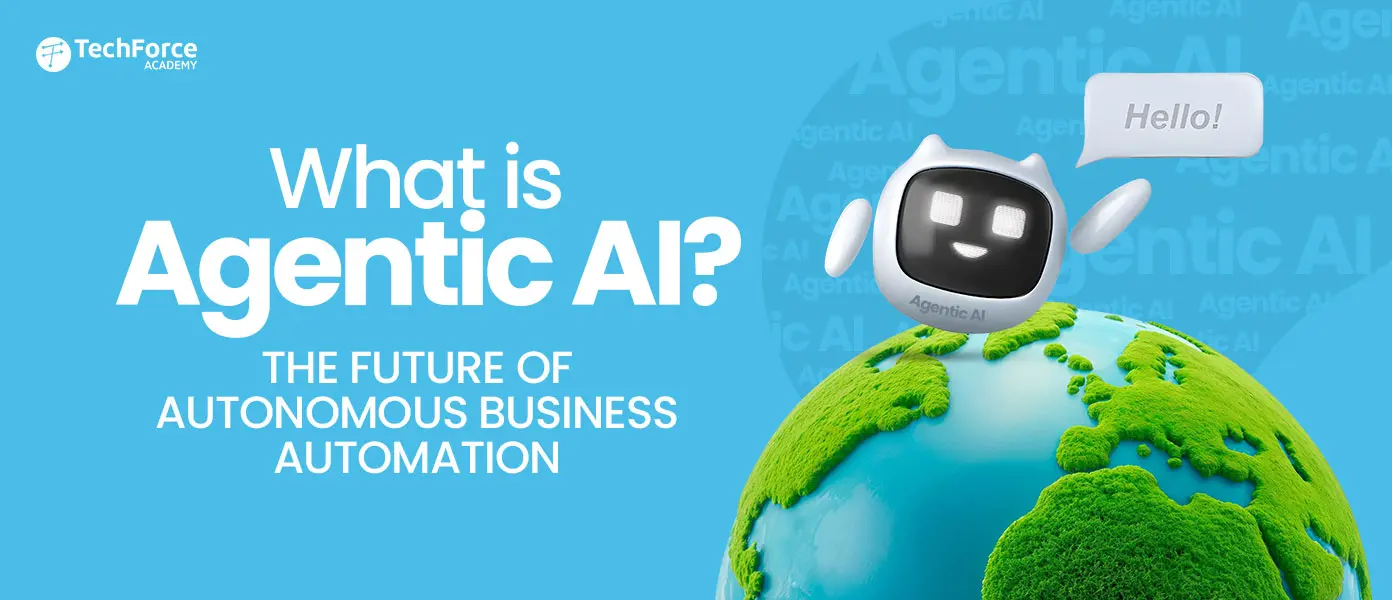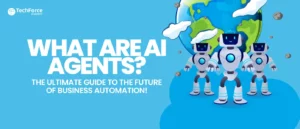The fusion of advanced AI and automation will give rise to autonomous agents that can understand, construct, and execute intricate business processes. This is the essence of Agentic AI evolution – the next step in the future of work.
It’s way more advanced than those old predictive and generative AI models. agentic AI combines large language models and machine learning (new and traditional AI, respectively) with enterprise automation to create autonomous AI agents.
This technology is expected to be a top strategic trend for 2025, mainly because it can adapt and make its own decisions. (Source: Gartner – Top 10 strategic tech trends)
This blog explores how agentic AI uses data and artificial intelligence to help businesses become more powerful, make employees more productive, encourage innovation, and discover new revenue streams.
What is Agentic AI?
Agentic AI is the next advancement in artificial intelligence. It can solve problems on its own using advanced reasoning and planning. Agentic AI systems are made up of multiple AI agents that work together to solve problems.
Unlike those basic question-answering systems, it can analyse data from different sources, develop strategies, and execute complex tasks. These systems understand the user’s goals and the context of the problem to be solved.
It is now being used to manage transactions and account balances, offering personalised customer service, software development, and patient interaction. This goes beyond simply answering questions, as it can handle complex processes.
It can transform industries like healthcare, finance, and manufacturing by integrating data platforms and automating time-consuming tasks. It’s like having a digital workforce that can make decisions and adapt quickly and efficiently.
Features of Agentic AI

1. Autonomous, Goal-Oriented Action
It makes independent decisions and takes action to achieve specific objectives. adapting to changing environments and new information. Furthermore, it is exceptionally proficient in adapting to changes and acquiring new knowledge.
The rise of autonomous decision-making, projected to handle 15% of daily decisions, highlights its significance.
2. Complex Process Automation
Instead of simply automating tasks, it manages entire processes and performs multi-step actions, even in unstructured environments.
3. Intelligent, Adaptive Systems
It can learn and modify its behaviour to solve complex problems by utilising contextual information and probabilistic decision-making (a way to make data-driven decisions that reduce uncertainty).
4. Beyond Generative AI
It prioritises decision-making and actions. Although it may utilise generative AI, its primary function is not content creation.
5. Complementary Automation
While RPA can manage structured tasks, agentic AI can work alongside it to handle dynamic aspects.
How Does Agentic AI Work?
Agentic AI uses autonomous software agents that learn from data and how users act. They use machine learning, NLP, and knowledge representation to do this. These agents, each with its own goal, collaborate to perform complex tasks. They also make communication and reasoning easier.
It uses a distributed systems platform for scalability and high performance. This platform lets multiple agents work together across different servers, making things more efficient and reliable. These agents work together in real-time, sharing information and coordinating actions to make user interaction better.
To automatically finish tasks and manage workflows it uses independent agents. These agents use machine learning, algorithms, and predictive analytics to make quick decisions.
Agentic AI solves complex problems using a 5 steps process:
Step 1 – Perceive: AI agents are like data detectives! They gather information from various sources, such as sensors, databases, and interfaces and turn it into useful insights. They’re great at spotting important patterns and figuring out what’s most relevant in their environment.
Step 2 – Reason: It uses a large language model as a central reasoning engine or brain. This “brain” handles tasks, formulates solutions, and manages specialised models for different jobs like creating content or processing images. It also uses a technique called retrieval-augmented generation (RAG) to access proprietary data and make sure the results are accurate and relevant.
Step 3 – Act: By connecting external tools and software via application programming interfaces (APIs), agentic AI performs tasks according to its plans. It’s like having a personal assistant that follows your instructions! AI agents can have guardrails implemented to ensure correct task execution, such as setting processing limits for a customer service agent.
Step 4 – Learn: A feedback loop, sometimes known as a “data flywheel,” is used by agentic AI to continuously improve. This makes it a powerful tool for businesses to make better decisions and improve efficiency.
Step 5 – Collaborate: Agent builder tools simplify agent deployment for programmers and newcomers. Their open-source nature fosters a collaborative community, driving innovation and continuous improvement. This collaboration makes sure that the tech stays ahead in the AI innovation game and also helps develop new features faster.
Benefits of Agentic AI

1. Significant Gains in Efficiency and Scalability
It can learn on its own and intelligently adapt to complex workflows. This means it can constantly improve processes and doesn’t need much human intervention.
This is great for organisations dealing with growing workloads because it boosts efficiency, allows for scaling up, and minimises disruptions.
2. Autonomous Management of Complex Operations
“Innovation distinguishes between a leader and a follower.” – Steve Jobs (Source: Inc.com)
Agentic AI empowers businesses to lead, not follow. Agentic AI can handle complex tasks on its own, so human workers to focus on higher-level tasks. For example, supply chain management can look at data from different places to forecast demand, find and fix problems before they happen, and suggest the best ways to do things.
It can even coordinate with suppliers directly using APIs to make things even more efficient.
3. Boosting Productivity Through Task Automation
It takes care of those boring, repetitive tasks that eat up your brainpower, freeing you and your team to focus on the stuff that humans are uniquely good at – things like strategic planning, creative problem-solving, and building relationships.
This leads to significantly increased productivity and efficiency.
4. Data-Driven Insights for Enhanced Decision-Making
With the help of agentic AI, businesses make quick, smart decisions by analysing tons of real-time data and giving them useful insights. It identifies subtle patterns, predicts potential outcomes, and offers data-driven suggestions for smarter choices.
5. Personalised and Engaging Customer Experiences
It can create highly personalised and engaging customer interactions by simulating human-like decision-making. This gives customers smooth and easy experiences that feel natural, no matter how they interact with the company. Ultimately, it improves customer satisfaction and loyalty.
6. Empowering Human Roles and Fostering Collaboration
Rather than replacing humans, Agentic AI increases human capabilities and empowers employees by streamlining workflows, improving communication, and giving personalised help.
This lets people focus on the more strategic, creative, and fulfilling aspects of their work. It also makes it easier for teams to work together and communicate.
7. Driving Innovation Through Experimentation and Analysis
When it comes to innovation and discovery agentic AI can really speed things up. It can dig through research data, identify trends, and suggest new solutions, making it a valuable tool for research and product development.
8. Enhanced Trustworthiness and Reliability of AI Systems
Agentic AI systems are less likely to hallucinate and more likely to make trustworthy decisions and recommendations because they are better able to assess the quality and reliability of information sources.
9. Reducing Operational Costs and Enabling Strategic Growth
By automating routine processes and optimizing resource allocation, it can significantly reduce operational costs. This means businesses can strategically reinvest freed-up financial resources into other areas, helping them grow and expand.
10. Transforming Human-Machine Collaboration for Complex Challenges
It can change the way people and machines work together, especially for complex problems that AI automation couldn’t handle before.
Think about things like managing complex IT systems on their own, quickly changing supply chains when something goes wrong, and having real conversations with customers to solve difficult problems.
From RPA (Robotic Process Automation) to Agentic Automation
The Problem with Traditional Automation (RPA): RPA is great for structured, repetitive tasks, but it’s not the best when things get complex, unstructured, and need decision-making and adaptation.
RPA’s limitations are driving the need for more intelligent solutions like Agentic Automation. Its projected growth in enterprise software (33% by 2028) highlights the market opportunity for this technology.
The Solution? Agentic Automation: This new way of doing things uses AI agents to deal with those more difficult processes. It’s not meant to replace RPA, it’s meant to work alongside it and make it even better!
How it Works: People set the goals, robots gather the info, and AI agents analyze and decide what to do. Then they tell the robots to carry out their decisions.
Use Cases of Agentic AI

1. Customer Service
Customer service is being changed by agentic AI by offering smart and proactive support. It can handle tricky questions, personalise interactions with each customer, predict what customers need, and automate chats and messages. This means happier customers and quicker responses.
Additionally, it improves self-service options and makes digital interactions feel more human. Plus, it can spot and fix problems, like late deliveries, before customers even complain.
The rise of Agentic AI is transforming how businesses interact with their customers, particularly in the digital realm. Gartner predicts that 20% of digital storefront interactions will be conducted by AI agents.
2. Software Engineering
It boosts developer productivity by automating repetitive coding tasks, so developers can focus on more complex challenges and innovation. By handling the mundane coding bits, it helps developers work smarter, not harder and create more advanced software.
Also read: Can AI replace human Developers?
3. Healthcare
It is changing healthcare by giving doctors quick access to important info from tons of medical and patient data, helping them make smarter choices.
It can also automate admin tasks, take clinical notes, give patients 24/7 support, create personalized treatment plans, and speed up the process of discovering new drugs.
4. Video Analytics
Video analytics is being enhanced by agentic AI, which lets AI agents handle tons of video data from different sources and do complex tasks like video search, summarisation, and visual question-answering.
These agents can also send anomaly alerts, create incident reports, and improve predictive maintenance and quality control through visual inspection.
5. Insurance
The insurance claims process is being streamlined by Agentic AI, which automates everything from initial filing to final payout. AI agents can check out claims, collect info, and chat with customers.
This means claims are processed faster, there are fewer mistakes, and customers have a better experience overall.
6. Logistics and Supply Chain Management
By analysing real-time data agentic AI can optimise routes, predict bottlenecks, and adjust inventory.
This means it can make logistics and supply chain management, thereby ensuring efficient delivery, leading to faster deliveries, lower costs, and happier customers!
7. Finance
Agentic AI is changing the way we make financial decisions! It can analyze market trends, find good investment opportunities, and even create personalized financial plans.
These AI agents can also manage risk, spot vulnerabilities, and ensure regulatory compliance. This frees up financial advisors to focus on building relationships and giving strategic advice – so it’s a win-win for everyone!
8. Manufacturing
It is changing the manufacturing industry by taking control of production lines, enabling product customization, and offering insights to improve product design.
By looking at sensor data, these AI agents can predict when things might break or when production might stop, which helps avoid downtime and save money.
They can even run virtual factories to get the most out of productivity and quality while using less energy and creating fewer emissions.
9. Sales Support
Sales teams can be freed from administrative tasks with the help of Agentic AI and spend more time nurturing and pursuing leads! AI agents can read customer messages and suggest next steps, schedule meetings, give answers, and write personalised responses.
They can also give human sales agents feedback and help them learn.
10. Testing
The testing process can be accelerated and optimised by the agentic AI! It can handle complex testing tasks under human supervision, like creating reports, designing and running tests, and even working with human testers to find and fix problems in testing plans and projects.
By taking care of these tasks, AI agents make the whole testing process more efficient and thorough.
Difference between Generative AI, Traditional AI AI Agents and Agentic AI
|
Feature |
Generative AI |
Traditional AI |
AI Agents |
Agentic AI |
|
Primary Goal |
Create new content/data (text, images, etc.) |
Analyse data, predict and automate tasks |
Perform specific tasks within an environment |
Autonomous systems with decision-making & action |
|
Key Function |
Learns patterns, generates similar content |
Uses algorithms to learn & improve |
Perceives environment, reacts, may learn |
Perceives, reasons, plans, acts to achieve goals |
|
Output |
Novel content (text, images, music, code) |
Predictions, classifications, automated actions |
Actions within a limited environment |
Complex actions, goal-directed behaviour |
|
Learning |
Learns from data to generate new content |
Learns from data to improve performance |
May learn, but often pre-programmed behaviours |
Advanced learning, adapts to changing situations |
|
Autonomy |
Limited; needs prompting or input |
Limited; often requires human oversight |
Varies; can be reactive or have limited goals |
High; designed for independent operation |
|
Examples |
ChatGPT, DALL-E, Stable Diffusion |
Spam filters, Recommendation engines, Fraud detection |
Chatbots (simple), Game AI characters |
Self-driving cars, Advanced robotics, AI assistants |
|
Relationship |
Distinct category |
Distinct category |
Building block for some Agentic AI systems |
Encompasses more complex AI systems; may use AI agents |
Also read: Difference between traditional AI and generative AI.
Ethical and Practical Challenges in Agentic AI Adoption
- Autonomy and Oversight: We need to keep AI autonomy in check while still having some human control. Too much autonomy can cause unexpected problems and even be harmful. To ensure AI actions adhere to ethical and legal standards, clear guidelines and oversight are necessary.
- Transparency and Trust: Agentic AI can be pretty complex, and it’s not always easy to figure out how they make decisions. This lack of transparency can make people worry about whether the system is fair and reliable, and it can also make them less likely to trust it.
- Security and Privacy: If we use agentic AI in enterprise systems that have sensitive data, it could be easier for hackers to steal data or cause cyberattacks. So we need strong security to protect this information.
- Accountability: Determining responsibility when autonomous decisions made by agentic AI result in negative consequences can be challenging. We need clear rules that keep humans in charge and AI in check.
- Data Privacy: To prevent misuse and unauthorised access to the vast amounts of sensitive data that Agentic AI systems rely on, strong data governance protocols are essential. This also means that we have to follow privacy regulations like GDPR and CCPA. It’s really important to make sure that we think about privacy right from the start.
- Over-Reliance: Negative outcomes can arise from an over-reliance on AI decision-making, which can also weaken human judgment. Human review is essential, particularly in complex situations that involve ethical considerations.
- Ethical Governance and Transparency: Clear ethical guidelines are necessary for the development and deployment of AI within organizations. These guidelines should clearly define the roles and responsibilities of AI agents and make sure that AI’s decision-making is easy to understand.
Best Practices for Agentic AI Implementation

- Strong Governance: Establishing clear frameworks and compliance measures that define roles, responsibilities, and ethical guidelines for all stakeholders involved in agentic AI development and deployment. This includes regular monitoring and auditing.
- Security and Compliance: Implementing robust security measures (encryption, access controls, vulnerability assessments) to protect sensitive data and maintain system integrity. It also emphasizes compliance with data protection regulations and establishing clear data usage guidelines to mitigate privacy risks.
- Testing and Validation: Conduct rigorous testing under various scenarios (both expected and unexpected) to identify and address potential flaws or unintended consequences before real-world deployment.
- Continuous Monitoring and Improvement: Regularly updating agentic AI systems to ensure effectiveness and security. This involves feedback loops, performance metrics, user feedback, and continuous learning to adapt to changing conditions and maximize the value of the AI investment.
- Regular Audits: Evaluating AI performance and compliance, and using the data to optimize workflows and address vulnerabilities.
- Transparent Decision-Making Frameworks: Documenting how AI agents interpret context and make decisions to foster trust and facilitate oversight. Explainable AI models are key here.
Agentic AI, Data Cloud, and RAG: A Winning Combination
Agentic AI and data platforms are like the ultimate power couple! They work together to connect all sorts of different data, making it easier for businesses to automate complex tasks and make real-time decisions.
This combo usually uses tech like Data Cloud and RAG, and it’s a total game-changer: improves efficiency, provides a competitive edge, simplifies deployment, and enables continuous learning, ultimately benefiting various industries and improving customer engagement.
Interested to learn more about Data Cloud? Enroll in our Data Cloud training course.
The Future of Agentic AI: A New Era of Intelligent Automation
- Data is Crucial: High-quality, diverse training data is really important for agentic AI to work well. When you run into problems with data (like regulations, sensitive info, or not enough data), synthetic data can be a good solution.
- Evolution to Multi-Domain Agents: They’ll be able to handle all sorts of tasks across different areas, managing complex workflows that are all connected. This requires advances in machine learning, LLMs, NLP, and self-learning algorithms. Key improvements include better contextual understanding, advanced learning algorithms, collaborative frameworks, and interdisciplinary knowledge integration.
- Sophisticated Decision-Making: It’ll be better at understanding situations, thinking ethically, and learning from what happens. This will involve improved ethical reasoning (balancing competing concerns), advanced learning, and improved context awareness.
- AI-to-AI Collaboration: Multiple AI agents will work together to solve complex problems, mirroring human teamwork. They’ll be sharing ideas, making decisions together, and figuring out how to use their resources in the smartest way possible. To make it all work, they’ll need to agree on how to communicate and have some ground rules.
Conclusion
Agentic AI is the next big step in business automation, much better than traditional RPA and basic AI models. It’s all about doing things on its own to reach goals and being smart enough to adapt to any situation.
This tech is going to change everything! It’ll make operations smoother, customer experiences better, and come up with new ideas. With agentic AI, businesses will be quicker, more efficient, and ready for the challenges of the future.
If you want to stay ahead of the game in 2025 and beyond, you need to get on board with agentic AI. It doesn’t matter if you’re in finance, healthcare, logistics, or software development – this is the future.
The best way to predict the future is to invent it.” – Alan Kay (Source: Ted Speaker)










